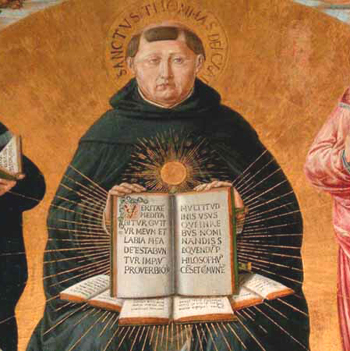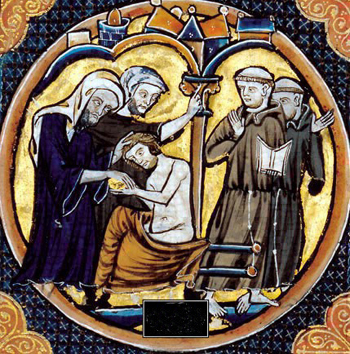 |
Socio-Political Issues
Against McNabb’s Utopia
Evangelical Poverty Is Not a Virtue for All
Patrick Odou
Evangelical poverty is often presented by the promoters of Distributism as an ideal to be attained by all of society. This erroneous position, which became a slogan of the “Catholic Left,” is defended in the writings of the most known religious man of the Distributist movement, Fr. Vincent McNabb.

The communist republic of Savonarola, above, applied the vow of poverty for all, like Fr. McNabb |
Below are a few quotes of McNabb dealing with the vows of Poverty, Chastity, and Obedience, which he repeatedly refers to as "virtues" at variance with the Catholic teaching which correctly refers to them as the Evangelical Counsels. Mcnabb writes:
• “The three virtues [poverty, chastity, and obedience] are binding upon all individuals and, in some measure, upon that grouping of individuals [known as] the State” (Old Principles and the New Order, New York: Sheed & Ward, 1942, p. 162).
• “These virtues ... are obligatory upon all men and women ...” (ibid. p. 163).
• “The religious men or women who have publicly promised God to keep poverty, chastity, obedience, are not thereby bound to more poverty, more chastity, more obedience than if they had remained as lay-folk in the world” (ibid.).
• “Religious men and women whose vow makes them more bound to poverty are not thereby bound to more poverty than are people living in the world” (ibid., p. 164).
• “To sum up. Every individual must be poor … Every State must be poor … Every State must be obedient” (ibid., p. 168).
I was really shocked to read McNabb – who claims to be a Thomist – make such a faulty social application of the Evangelical Counsel of poverty, because it contradicts the traditional teaching of the Church.
The three evangelical counsels
The Church distinguishes in the Gospel what Our Lord ordered everyone to do – an evangelical precept or command – and what He advised only some to do if they feel a special call to be perfect – an evangelical counsel.
The most important precept is to love God above everything and one’s neighbor as oneself. It is called the Precept of Charity, or New Commandment, that confirms the Ten Commandments of the Old Testament.
The three religious vows are considered the realization of the evangelical counsels, and characterize what in the Church is called the state of perfection.
- Obedience was counseled by Our Lord when He said: “If any man will come after me, let him deny himself, and take up his cross, and follow me” (Matthew 16:24, see also Matt 20:27-28, Mk 10:45).
- Chastity was counseled when Our Lord said that some should remain single for the Reign of Heaven: “And there are eunuchs, who have made themselves eunuchs for the kingdom of heaven” (Matt. 19:12; see also 1 Cor. 7:25).
- Poverty, when He counseled the rich young man who wanted to follow Him to sell everything, give the money to the poor, and come with the Apostles (Matt 19:21).
The practice of this state of perfection is recognized by the Church in the Religious Orders and Congregations, Societies of Consecrated Life, Secular Institutes, Hermits and Consecrated Virgins. Each one of these five genres has its own proper characteristics distinguishing one from another, and mainly distinguishing it from the common faithful.
In society it is anti-natural for the exception to become the rule

St. Thomas Aquinas teaches that the people must have property; the vow of poverty is only for a few |
The general teaching of the Church is that this state of perfection is not to be practiced by the ensemble of the faithful. St. Thomas is quite clear on this point:
“For to gain the aforesaid end [Heaven], man does not need to renounce the things of the world altogether, since he can, while using the things of this world, attain to eternal happiness, provided he does not place his end in them” (I, II, q. 108, a.4).
The Church must have differentiated states of perfection:
“There is need in the Church, which is the body of Christ, for the members to be differentiated by various duties, states and grades” (II, II, q.183, a.2, ad 2).
In other place he stresses: “Our Lord in proposing the evangelical counsels, always mentions of man’s fitness for observing them. For in giving the counsel of poverty He begins with these words: ‘If thou wilt to be perfect ...’” (I, II, q. 108, a. 4, ad 1).
Therefore, the state of perfection is not for everyone, but only to the elite who received such vocation. These counsels must inspire all, but be practiced only by a few, a proportionally small number, just as the head or the heart are small members compared to the whole body.
Hence, these counsels should not be transformed into laws applicable to the whole of society. This is understandable in principle, because given original sin, in a Catholic society only a few seek perfection, while the majority of persons are satisfied to lead an upright life. In practice, moreover, this becomes even clearer, because if one tries to apply the counsels of perfection to everyone, society would be destroyed. Let me demonstrate this point with regard to each of the three counsels.
The easiest to understand is the vow of chastity. As everyone knows chastity, as an evangelical counsel, is to abstain from sexual relations. If you apply chastity to the whole of society, it is doomed to live just for the period of one generation. Since no one would have children, society would disappear.

Franciscan friars trying to convert Albigensians from their errors |
Some heresies of the past, such as that of the Albigensians, tried to apply chastity to the whole of society. The medieval world would have been defeated by nature if the Church had not condemned their doctrines and stopped their march.
Obedience, as an obligation to do always the will of another under penalty of sin, if applied to the entire society, would create the most radical despotism. It would destroy the natural liberty that the common man possesses in his actions, and would consequently create a whole society of slaves.
In some ways the ephemeral communist republic of Savonarola in Florence was an example of this.
Poverty, understood as a complete abandonment of temporal goods and living from a common burse according to one’s needs, if applied to the whole society destroys any encouragement for progress, levels the competent and the incompetent, and smashes the natural differences of personalities, creating a society of penury.
It appears that some heresies of the past, such as the Fraticelli, attempted to realize this utopia and faced complete failure and the condemnation of the Church.
I believe that this demonstrates that the practice of the evangelical counsels is for a few, not for everyone in society. As a general rule, the various members of society should marry, have property, and enjoy a proportional natural freedom. At the same time, for society to have balance, the example of those who practice the evangelical counsels is indispensable:
• For couples to be faithful to one another in their matrimonial duties, for youth to be chaste until marriage, for persons to look to the pleasures of Heaven instead of earth, it is indispensable to know that some men and women live in a state of perfect chastity out of love for God and Heaven.

Simon de Monfort, above, was the leader who ended the Albigensian heresy in France |
• For subjects to properly accept the orders of their civil superiors, for citizens to not revolt against just laws, for society to respect the highest classes, it is indispensable to know that a few who chose the state of perfection obliged themselves to live in a state of perpetual obedience.
• For superiors of all kinds, be they ecclesiastic or temporal, to know that some of their neighbors chose to renounce all earthly power in order to follow Our Lord Jesus Christ, gives a good example that helps them moderate their use of power and be clement with their subjects.
• For all members of society to know that some of its members renounced their legitimate properties to live in complete poverty, helps them limit and balance the use they make of their own properties and money.
The conclusion is simple and clear. The practice of the evangelical counsels is an extraordinary call to a few members of society. They are not the rule for all, they are the exception. Being an exception, they balance the life of the entire society. However, if someone tries to apply these counsels to all of society, he goes against natural order, he creates a monster, and he is destined to fail.
It seems to me that Fr. Vincent McNabb missed his target. As long as he struggles for evangelical poverty to be applied to all of society, he promotes a utopia. He is proposing something that is impossible and sooner or later alienates his more sensible followers.
To promote such an error as we are seeing Distributists do in the U.S. is just another attempt to mislead traditionalist Catholics toward the long, winding and sinister river of Socialism.

Posted July 11, 2007

Related Topics of Interest
 St. Thomas against Distributism St. Thomas against Distributism
 Distributists Misleading Their Audience about Capitalism Distributists Misleading Their Audience about Capitalism
 A Distributist Manifesto Spiced with Communism A Distributist Manifesto Spiced with Communism
 Socialism and Distributism in Catholic Clothing Socialism and Distributism in Catholic Clothing
 Eric Gill, a Precursor of Vatican II Eric Gill, a Precursor of Vatican II
 Eric Gill: the Pedophile Founder of Distributism Eric Gill: the Pedophile Founder of Distributism
 Other Moral Pearls of Eric Gill Other Moral Pearls of Eric Gill
 A Torrent of Pros and Cons on Eric Gill A Torrent of Pros and Cons on Eric Gill

Related Works of Interest
|
|
Social-Political | Hot Topics | Home | Books | CDs | Search | Contact Us | Donate

© 2002- Tradition in Action, Inc. All Rights
Reserved
|
 |
|